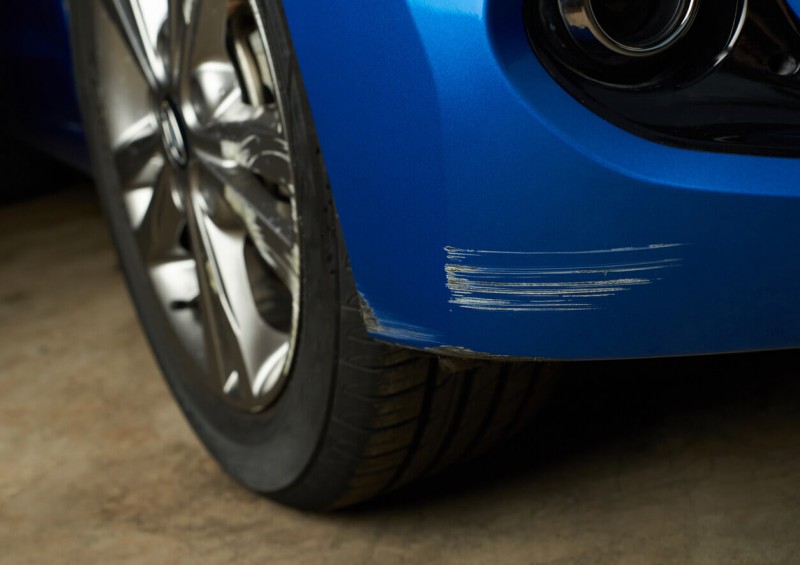I've Damaged My Leased Vehicle: What Do I Do?

First thing’s first – don’t panic! It’s easy to suddenly imagine that you are going to be in all sorts of trouble, but the reality is that you are going to have your car for about 30,000 miles-worth of driving and the finance company isn’t expecting you to drive perfectly for all 30,000!
Of course, they hope you will, but these things do happen. Such is life!
Skip to a relevant section below or continue reading:
What happens if you damage a leased car?
Who pays for repairs on a leased vehicle?
What happens when a lease car is totalled?
Returning the leased car damaged
Disputing end of car lease charges
What happens if you damage a leased car?
There’s damage, and there’s damage. If your leased car has been involved in an accident, whether that’s with another vehicle or something stationary such as a tree, then you need to get it repaired.
Contact the finance company immediately to arrange the repair by an approved garage, and if the damage is considerable (i.e. more costly than your insurance excess) then you’ll want to call your insurance company as well. If the damage was not your fault then the cost of repair will fall to the other party’s insurer. For more information, check out our article on what to do when your leased car is involved in an accident.
If the damage is minor, however, then you have the option of dealing with it there and then or waiting until later.
Who pays for repairs on a leased vehicle?
Ask yourself – ‘whose fault is this?’ and answer honestly. If the answer is ‘mine’, then you need to pay for the repairs.
Your leased car is under warranty, which is good for mechanical faults and things that shouldn’t go wrong with the car, and it may have a maintenance contract which is good for servicing and tyres, but no one else is going to pay for you bumping it into a tree!
Body damage to a leased car is going to cost you in end of car lease charges or penalties when you return the car, and it is probably best to have it fixed in advance. Returning a leased car with damage that is beyond fair wear and tear can be costly and it’s usually far cheaper to have it repaired yourself beforehand. Just make sure you take it to an approved repair centre – again, this can be more costly, but you’ll be reassured that the job will get done the right way.
What happens when a lease car is totalled?
A total loss (the technical insurance term for a ‘written off’, or ‘totalled’ car) will be reimbursed by your insurance company – even if it was your fault. You will have to deal with both the finance company and your insurer to organise the money and paying the remainder of the lease agreement off. Remember – you will not get the full market value of your car as you will be liable for the excess amount on your insurance.
One of the biggest problems with a leased car total loss, is that the current market value of the car that will be paid to you by your insurer may be less than the amount needed to clear the remaining debt to the finance company, and you could find yourself out of pocket by a large amount. For this reason, we always recommend GAP insurance, which is designed to cover this deficit.
In all outcomes, if your lease car is a total loss then your lease contract will end, and you will have to begin a new one to get back on the road.
Can I repair a leased car?
No matter how skilled you are, performing repairs on your leased car is not recommended. You will not be considered an authorised repairer by the finance company and if there are any queries regarding the work you have done, even if it’s just a fix for a scratch, then you could be liable to have the repairs redone with an authorised garage or charged additional penalties.
Returning the lease car damaged – the fair wear and tear guidelines
The finance company will follow a set of guidelines for what they consider to be fair wear and tear on the vehicle. These will be in accordance with the British Vehicle Rental and Leasing Association (BVRLA) guidelines used nationally to avoid disputes.
On the whole, the guidelines are common sense – if the damage is reasonable for three years (or however long) of careful driving, then there will be no penalty charge, but if any scratches or dents exist that are obviously the result of poor care then there will be a cost associated with that.
One thing that is important to note is that the leasing company will not actually repair the damage. The penalty that they charge you is based on an estimate of how much the damage devalues the car in an auction environment. This estimate is likely to be higher than the actual cost of repair, which is why it is always best to get the car brought up to standard before its return.
Remember – damage isn’t just external. If you have caused the upholstery to become heavily scuffed or even cut, or for the carpets or dashboard to be damaged then you will be considered liable for those charges. The finance company are going to want to get the maximum amount possible from the sale of the vehicle and will not look kindly on any damage that hinders that outcome.
Furthermore, if there is an unpleasant smell in the car, it is considered damage. Smoking is the primary candidate for causing an unwanted level of odour in the vehicle and should be avoided in a leased car, but food and other things can also cause an unpleasant smell and can cost you money if the interior isn’t properly cleaned and aired prior to the return.
In short – do everything you can to get the car looking beautiful before you give it back and you’ll reduce the number of penalties.
Read our useful blog How to Look After Your Leasing Vehicle for more information on how to properly take care of your vehicle throughout your lease contract.
Disputing end of car lease charges
You may be concerned that you will be charged more than is fair. It is always good to have evidence of the car state before you returned it. Spend some time with your phone taking pictures of the car before sending it back – the photos will be appropriately dated and time-stamped and they are useful in proving your side in any discrepancy.
You will need to contact the finance company to do this. Each has its own process for disputes, and you should follow these guidelines. Make sure in all cases to keep a copy of all communication and any other documentation that’s relevant to your case.
Help from Complete Leasing
Though we can’t repair your car, or turn back time to make that moment when you reversed into a post never happen, we are here to help you with any of your leasing questions – so if you want to know more about fair wear and tear or how to deal with a repair, give us a call today!




































